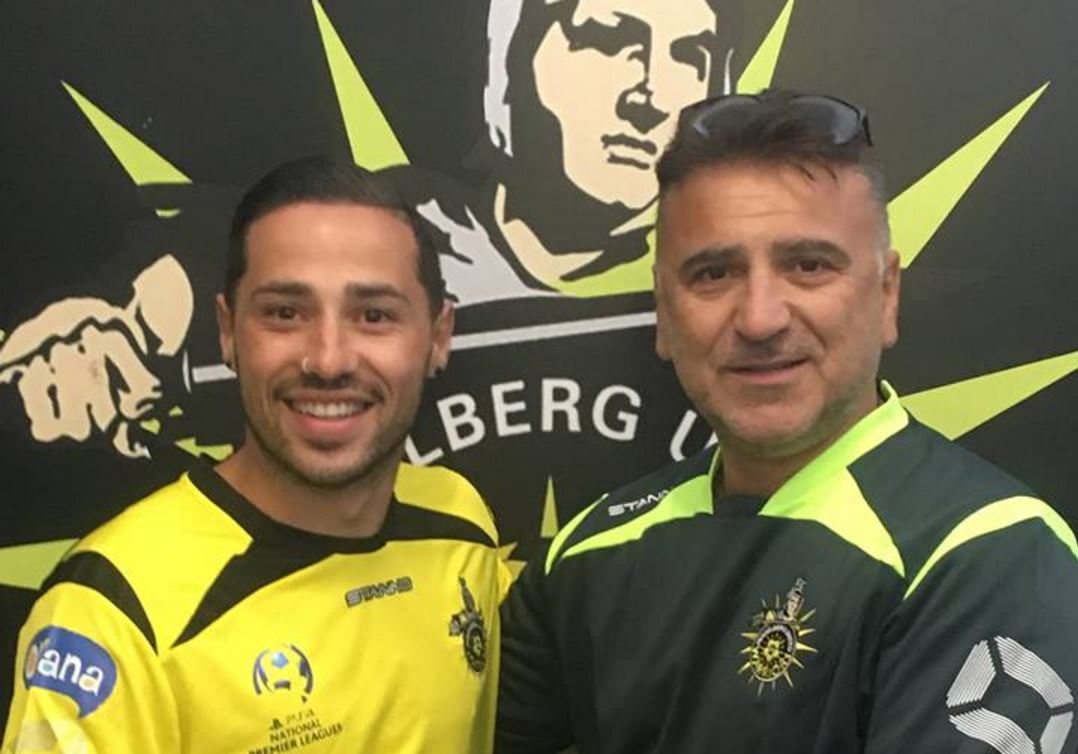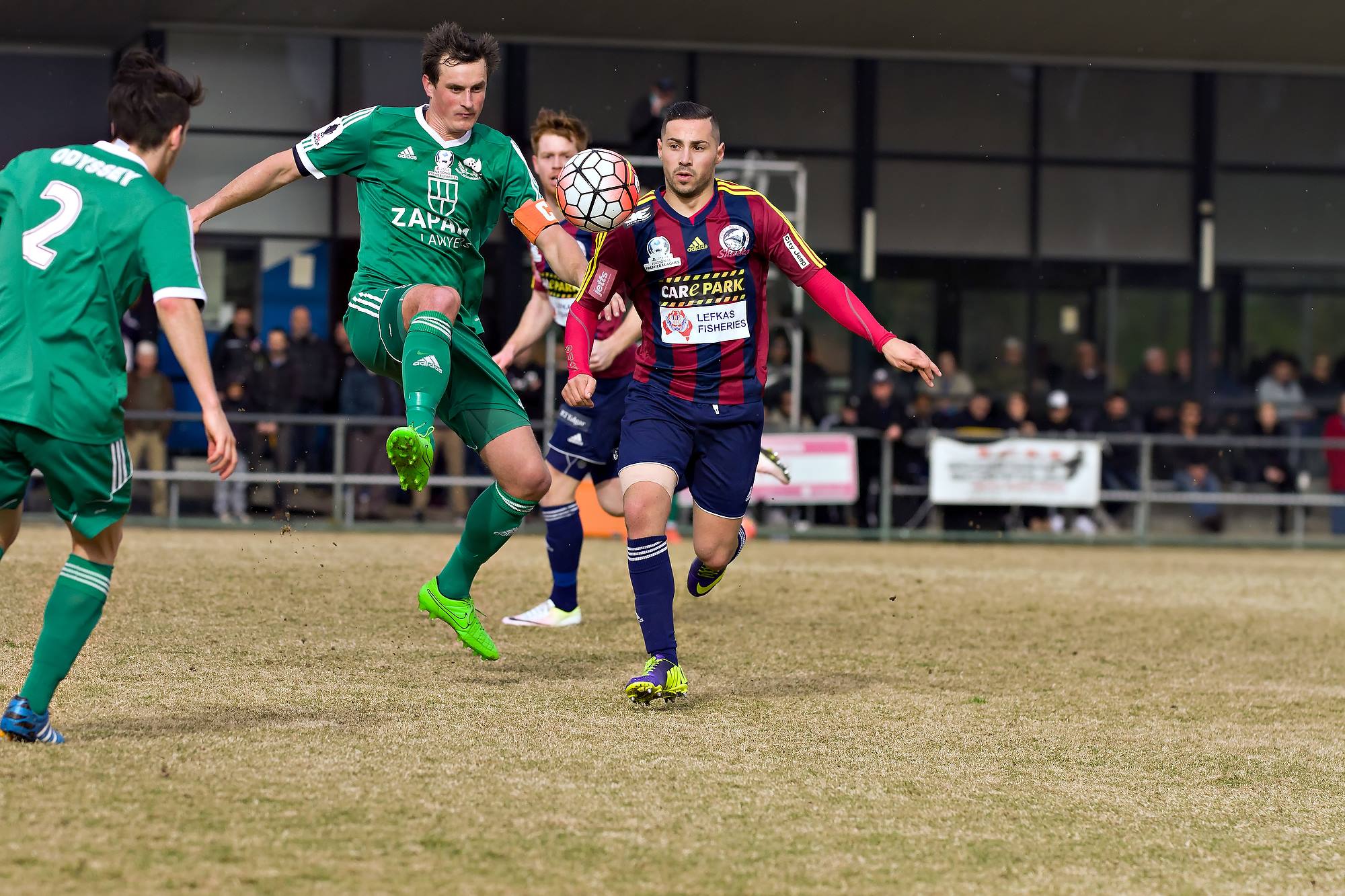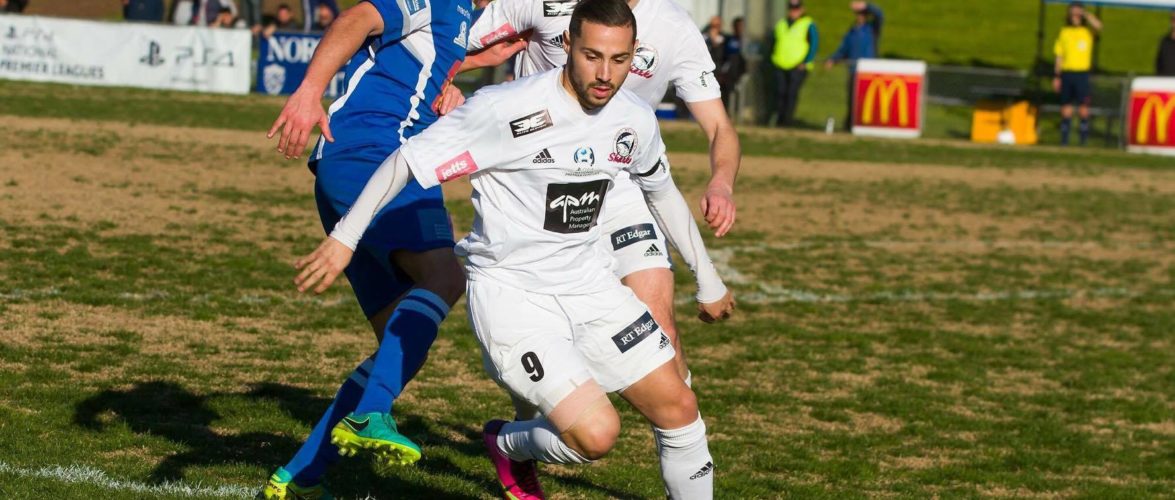Image: Australian Sporting Photos
Adrian Zahra is a name Australian football fans know all too well for the most unfortunate of reasons. It was back in January 2011 that one of the darkest episodes in the A-League’s history briefly extinguished the shining light that was one of the A-League’s exciting young talents. Yet after five long years, it appears Zahra’s zest for the game is once again burning brightly.
It was the 79th minute of the third ever Melbourne derby, with both sides evenly locked across a titanic struggle. The ever-dynamic Zahra had received the ball on the right wing, skipping past his opponent before rapidly bearing down on goal.
It was then that Melbourne Victory’s ferocious Kevin Muscat, notorious for his take-no-prisoners attitude, flew in to a tackle on the Melbourne Heart midfielder that normally reserved commentators instantly denounced as both ‘horrible’ and ‘disgraceful’.
Muscat’s horrific two-footed challenge on Zahra made international headlines, garnering worldwide condemnation. The Victory skipper was suspended, in his last professional season, for an unprecedented eight matches. It was a tackle marked in hindsight as the beginning of the end for Muscat’s career.
Cruelly however, the fledgling Zahra would wear the brunt of its lasting effects. It was a tackle that destroyed the promising winger’s season, requiring a full knee reconstruction at the age of just 20. It was an injury that the former Melbourne Kights product himself believes ‘overshadowed’ the rest of his career – he departed Heart after 19 games and two goals.
Following an ‘eight-to-10 month recovery’ Zahra resurfaced in 2012 with a basement-dwelling Perth Glory side in continual turmoil, where he never gained a first team place. Following two years and 18 league appearances yielding three goals, aged just 23 he took a shot at Europe, moving to the Maltese capital Valletta.
Luck again was not on Zahra’s side. After only two months, FC Valletta were mired in financial strife after failing to qualify for the Champions League. Zahra’s wage conditions were slashed, and once again he would be forced to move, this time returning to his own humble beginnings at the Melbourne Knights.
Two years later though and Zahra is not only joyously injury free, he’s excelling, undergoing the best run of appearances throughout his career.
The knee, he remarks hurriedly, is ‘fine’. You can understand his reluctance to discuss the matter; beneath the frustration there still lies some resentment over what happened. Yet for Zahra there are definite positives emerging in his game, and finally people are beginning to sit up and take notice.
A regular in the Port Melbourne Sharks’ challenging 2016 campaign, Zahra has re-ignited his presence amongst Victoria’s brightest talents. He earned a move to NPL powerhouses Heidelberg United, where his arrival will add yet another element of flair to one of the most feared attacking line-ups in the competition.
On a personal level, the move has restored some much-needed confidence to the former prodigy.
“I feel very positive,” Zahra says. “Heidelberg came so close to winning it last season, finishing second after starting on minus three points.”
“I’m going there with the thought and plan of making it that one better. ‘Kats’ (George Katsakis) and the club want to win things and are very close to doing that.”

A wealth of experience seems to have taught Zahra many things. He comes across cool and composed, with strong conviction in his voice. At 26-years-old, he also has a keen sense of his abilities and how they’re best utilised.
“A strong forward like Kenny (Athiu) I think’s going to help. I was missing that at Port, a strong forward who can hold the ball up,” Zahra suggests, before cementing the point. “It’s something that’s definitely going to help me. Hopefully I can play the number 10 role and it’s something I can add value to.”
With Zahra, it’s always realistic optimism. Such understanding would be worth little had it not also imparted the knowledge that nothing comes easy. Former status means little in the cutthroat world of sport. Olympic Park is packed to the rafters with attacking stock and Zahra knows he’ll have to earn his place.
“If I think too far into it then (the competition for places) would become a worry, but as it is at the moment I know I still need to perform and do the right things for myself,” Zahra says.
“You can never go into a team expecting to become a walk in. Unless you put in the hard yards there’s no point being complacent with yourself.”
Looking toward the future, Zahra’s aspirations don’t end with silverware. At the physical peak of his career, he feels he “still has a lot to offer”. Regaining self-belief has been a hard road for Zahra, but it’s just the beginning.
“After a few disappointing years you just fall out of love with football,” Zahra reflects. “Last season with the Sharks I just got that feel for it again.”
“When it comes to the incident that happened five years ago, I feel as if people haven’t forgotten about it and I have and I’ve moved on from it.”
While one can appreciate Zahra’s need to focus on the future, he is equally able to acknowledge the recuperation that it’s required.
For any young sportsperson who dreams of a professional career, the work undertaken to get there is tremendous. To handle having that all undone, albeit for a short yet crucial period, can mentally be a killer blow. Arguably, for Zahra, he just never wanted to merely fall by the wayside.
“I lost my love for football because for four years, as a professional athlete, you’re in the system.” Zahra says. “You feel hard done by as you’re forgotten about and I felt hard done by in Perth.
“Then there were issues in Malta, you come back and it’s back to reality. You’re back in the NPL and everything you’ve worked so hard for has been taken away.”
To add insult to injury, Zahra feels his recovery was given no favours by the worldwide attention that followed Muscat’s challenge. Being thrust into the national spotlight at a young age is never easy, yet such exposure into a personal journey is a constant distraction.
“(The resulting attention) played a big part. It was the inconsistency as a young player, performing one week then not the other.” Zahra answers. “I feel like everyone thought the injury played a big part but the reality was my knee was fine.”
“It definitely overshadowed (my career). No matter where I go now I meet people and the first thing they say is ‘what about that tackle?’”
“I think the way it was pumped up has played a big part in the way my career has gone. That’s probably another reason why there hasn’t been a lot of opportunity to go back.”
“You feel like your luck’s going to turn at some point but then it just wasn’t happening, so the love was gone for a while. But then going back to Port and speaking to a close friend of mine in coach Eric (Vassiliadis), that love came back.”
The NPL may owe a lot to Port Melbourne’s former coach. Should Zahra shine as brightly as many expect amongst the Bergers’ dynamic forward line, Vassiliadis’ timely involvement when it was most needed – especially after a difficult homecoming at Melbourne Knights – should not be overlooked.

“I felt like I was appreciated, needed and wanted and I could make a massive impact and show people the player that I am,” Zahra says. “You fall out of that feeling when you’re on the fringe of being a footballer in a pro league.”
“When you’re a main player, that feeling was what kept the fire in my belly to keep wanting to perform and show my character week in and week out.”
While conveying challenges he’s had to overcome, there appears a conscious attempt on Zahra’s behalf to subdue any sense of pathos surrounding him. Relentlessly looking forward is so often the modus operandi of any sportsperson.
This means that when speaking of hardships most footballers could only imagine, there is a surprising lack of fragility in Zahra’s voice. His tone remains unwavering whether discussing his journey’s darkest or liveliest chapters.
Approaching the 10th year of his senior career, Zahra now assumes the role of a hardened campaigner. As a result, any sympathy arising for the resilient winger is often replaced by an inspired sense of awe.
It may seem a cliché that Zahra could act as an inspiration to any young sportsperson within a sporting realm teeming with tales of footballers defying the odds, but there is a resolute determination in his voice that speaks volumes of his attitude.
It is no wonder then, when he refers to character, you wholeheartedly pay attention. As a mentor for the next generation, while many may emanate with similar skill, few will come with as important an experience.
“As a young player the toughest thing was the inconsistency, you’re continually questioned on how you’re feeling and how your body is,” Zahra reflects. “You’re still learning about yourself and your character.”
“You try to tell young players about your experiences and what you’ve been through. Being a young player in the A-League and even in the NPL there’s a lot of hype.”
“Younger blokes have to not care about what people say and just keep performing. You’ve got to keep your head just above water and not in the clouds.”
Keeping your head above water is deceptively sound advice for youth, instructed perceptively by someone who was seldom given that chance. For Zahra though, with his ambition, little less than success at Heidelberg will suffice.
Now the spotlight has momentarily returned, and the time has come for Zahra to perform. There’ll be no excuses for a player who doesn’t want any sympathy, just a platform to prove himself against the best in the state.

